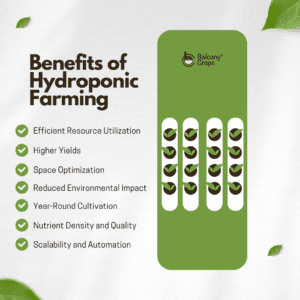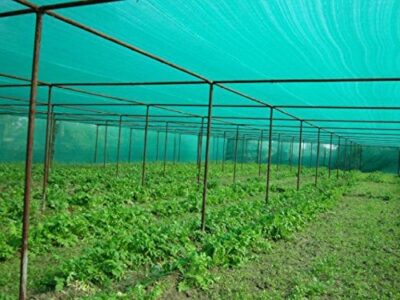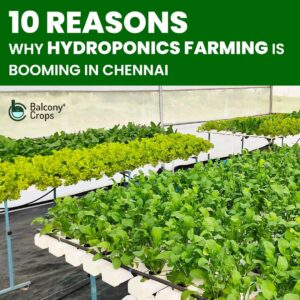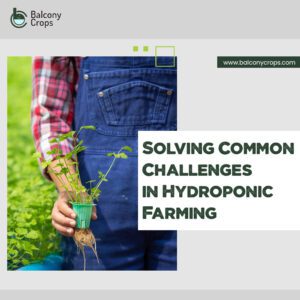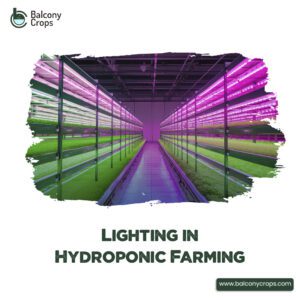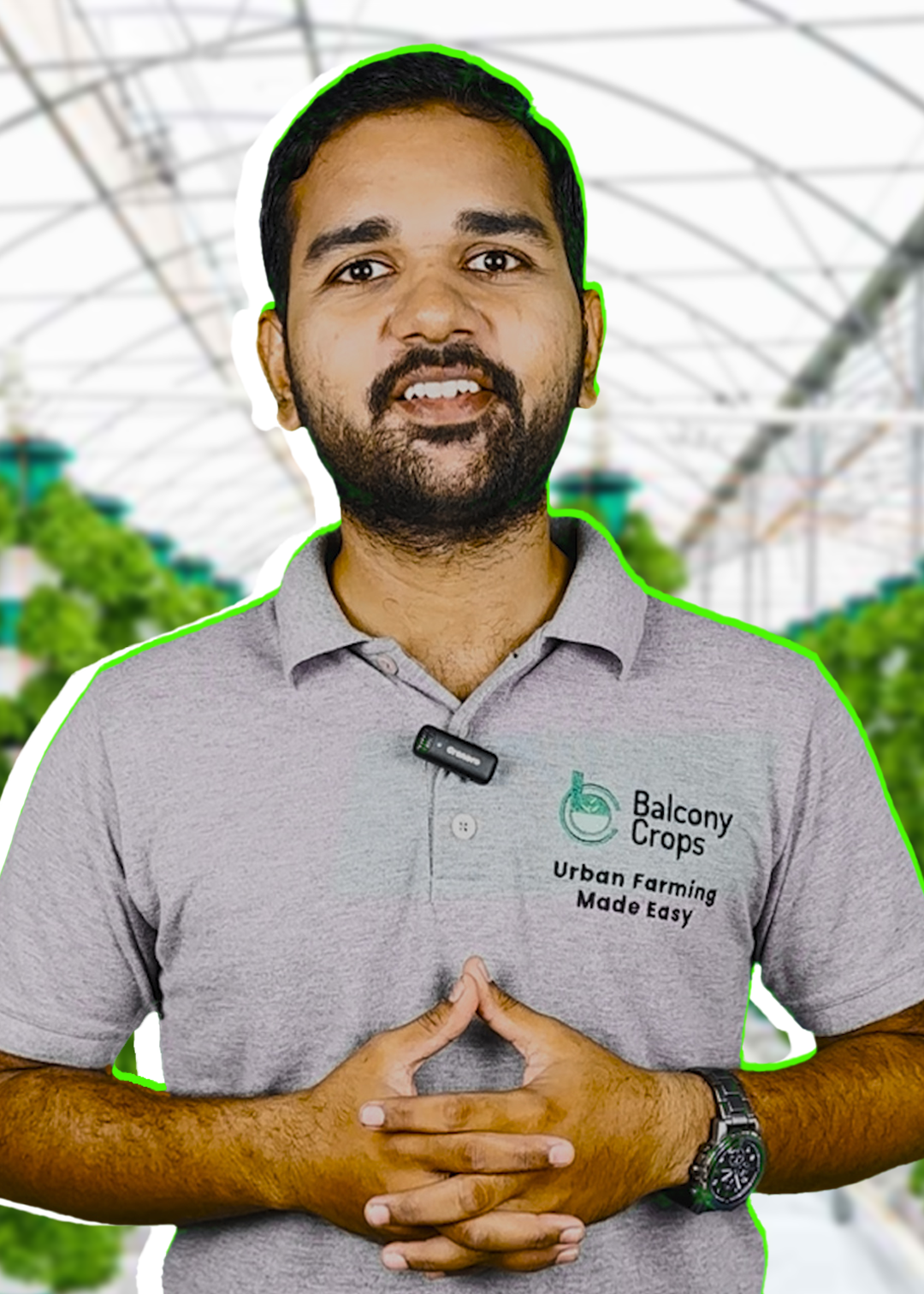Table of Contents
Hydroponics farming represents a revolution in agriculture, offering a sustainable and efficient alternative to traditional soil-based farming methods. This innovative technique involves growing plants without soil, using nutrient-rich water solutions to deliver essential minerals directly to the roots. In recent years, hydroponics has gained traction worldwide, promising higher yields, reduced water usage, and year-round cultivation possibilities.
The Current State of Hydroponics in India:
Despite its immense potential, hydroponics farming is still in its nascent stages in India. However, in recent years, there has been a notable surge in interest and experimentation with this innovative agricultural technique
- Adoption and Awareness:
While hydroponics is more prevalent in urban areas, there is growing interest and adoption in peri-urban and rural regions as well. Farmers, entrepreneurs, and agricultural enthusiasts are increasingly recognizing the benefits of hydroponics and are eager to explore its commercial viability. - Government Initiatives:
The Indian government has also taken steps to promote hydroponics and other soilless farming methods. Various schemes and subsidies are being introduced to encourage farmers to adopt modern agricultural practices, including hydroponics. However, more comprehensive policies and support systems are needed to facilitate widespread adoption and scale-up of hydroponic farming ventures.
- Research and Development:
Academic institutions and research organizations are actively engaged in studying and refining hydroponic techniques tailored to Indian conditions. This ongoing research is crucial for optimizing crop yields, resource efficiency, and cost-effectiveness, ultimately making hydroponics more accessible and viable for Indian farmers.
- Challenges and Opportunities:
While hydroponics offers numerous benefits, it also presents challenges such as high initial investment costs, technical expertise requirements, and market access barriers. However, these challenges are accompanied by significant opportunities, including diversification of agricultural produce, sustainable water management, and enhanced food security. As awareness grows and technology advances, the future of hydroponics in India looks promising, with the potential to revolutionize the agricultural landscape.
Benefits of Hydroponic Farming :
Hydroponic farming offers a myriad of benefits compared to traditional soil-based agriculture. Let’s explore some of the advantages:
- Efficient Resource Utilization: Hydroponic systems use water more efficiently than traditional farming methods, with water savings of up to 90%. This is especially significant in water-scarce regions like India, where sustainable water management is crucial for agricultural sustainability.
- Higher Yields: By providing plants with precisely controlled nutrient solutions and optimal growing conditions, hydroponic systems can significantly increase crop yields. Studies have shown that hydroponically grown crops often yield more produce in less time compared to soil-grown counterparts.
- Space Optimization: Hydroponic systems are highly versatile and can be adapted to various indoor and outdoor settings, making them ideal for urban agriculture and small-scale farming. Vertical farming techniques further maximize space utilization, allowing for high-density cultivation in limited areas.
- Reduced Environmental Impact: Hydroponic farming minimizes the need for chemical pesticides and fertilizers, reducing environmental pollution and soil degradation. Additionally, the closed-loop water recirculation systems used in hydroponics help conserve water and prevent nutrient runoff, mitigating the negative impact on surrounding ecosystems.
- Year-Round Cultivation: Unlike traditional farming, which is often seasonal and weather-dependent, hydroponic farming enables year-round cultivation, regardless of climatic conditions. This ensures a steady and reliable supply of fresh produce throughout the year, contributing to food security and stability.
- Nutrient Density and Quality: Hydroponically grown crops are known to have higher nutrient densities and superior taste compared to conventionally grown produce. By optimizing nutrient delivery and environmental conditions, hydroponic systems produce healthier and more flavorful fruits, vegetables, and herbs.
- Scalability and Automation: Hydroponic systems can be scaled up or down to meet specific production requirements, making them suitable for both small-scale hobbyists and large commercial operations. Furthermore, advancements in automation technology enable efficient management and monitoring of hydroponic farms, reducing labor costs and increasing productivity.
Challenges and Misconceptions :
- High Initial Investment Costs
Perception: Hydroponic farming is seen as expensive due to the high upfront costs of setting up systems.
Reality: Though the initial investment is significant, the long-term benefits and cost savings often outweigh these costs.
Economic Trends: Advances in technology and economies of scale are reducing the costs of hydroponic equipment and supplies, making it more accessible. - Complexity and Need for Specialized Knowledge
Misconception: Hydroponic farming is perceived as complex and requiring specialized expertise.
Truth: While there is a learning curve, modern systems are user-friendly and adaptable to various skill levels.
Solution: With appropriate training and support, farmers can easily learn hydroponic techniques and start benefiting from them.
- Solutions to Overcome Challenges and Misconceptions
Education: Raising awareness about the true costs and benefits of hydroponic farming.
Training: Providing practical guidance and training to farmers and entrepreneurs.
Policy Support: Implementing policies that support the adoption and scaling of hydroponic farming in India.
By addressing these challenges and misconceptions, India can fully leverage hydroponic farming for sustainable agriculture.
Commercial Hydroponic Farming Opportunities in India :
The burgeoning demand for high-quality, locally grown produce presents lucrative opportunities for commercial hydroponic farming ventures in India. Here are some key factors contributing to the growth and potential of the hydroponics industry:
- Market Demand: With increasing awareness of health and sustainability issues, consumers are seeking out fresh, pesticide-free produce grown using environmentally friendly methods. Hydroponically grown fruits, vegetables, and herbs cater to this demand, commanding premium prices in both domestic and international markets.
- Urbanization and Land Constraints: Rapid urbanization and shrinking agricultural land in urban and peri-urban areas create challenges for traditional farming practices. Hydroponic systems offer a solution by allowing cultivation in controlled indoor environments or utilizing unused spaces such as rooftops, warehouses, and vertical farms.
- Diversification of Crop Production: Hydroponic farming enables the cultivation of a wide variety of crops, including leafy greens, tomatoes, cucumbers, strawberries, and herbs. By diversifying crop production, hydroponic farmers can mitigate risks associated with seasonal fluctuations and market demand, ensuring a steady income stream year-round.
- Technology and Innovation: Advancements in hydroponic technology, automation, and data analytics are driving efficiency, productivity, and scalability in commercial hydroponic farming operations. Integrated systems with sensors, monitoring devices, and remote control capabilities enable real-time monitoring and management, optimizing resource utilization and crop performance.
- Government Support and Incentives: Recognizing the potential of hydroponic farming to boost agricultural productivity and income, the Indian government is introducing policies, subsidies, and incentives to encourage investment in the sector. Schemes promoting entrepreneurship, skill development, and technology adoption are creating a conducive environment for aspiring hydroponic farmers to enter the market and thrive.
Hydroponics Kit Delivery to Chennai :
Balconycrops offers convenient and reliable delivery of hydroponics kits to Chennai, catering to the growing demand for urban farming solutions in the region. Whether you’re a beginner looking to start your hydroponic journey or an experienced farmer seeking to expand your operations, our comprehensive kits provide everything you need to set up and maintain a successful hydroponic system.

Each kit includes
- Fabric Breathable Grow Bag: Allows for air pruning and healthy root development, enhancing plant growth.
- Cocopeat Brick: A sustainable and efficient growing medium that retains moisture and nutrients effectively.
- Hydroponic Flowering Nutrient Solution: Specially formulated to support the flowering stage, ensuring vibrant blooms and optimal growth.
- Seeds of Your Choice: Select from a variety of seeds to grow your preferred fresh and nutritious produce.
- Instruction Manual: Detailed instructions for assembly, operation, and maintenance of your hydroponic system, making it easy for beginners.
Check out our hydroponics kits
Mini Balcony Garden Kit
Elite – Vegetable/Flowering Grow Kit
Our team is committed to providing exceptional customer service and support, assisting you at every step of your hydroponic farming journey. Take the first step towards sustainable agriculture and join the hydroponic revolution with Balconycrops. Order your hydroponics kit today and embark on a rewarding and fulfilling farming experience.




